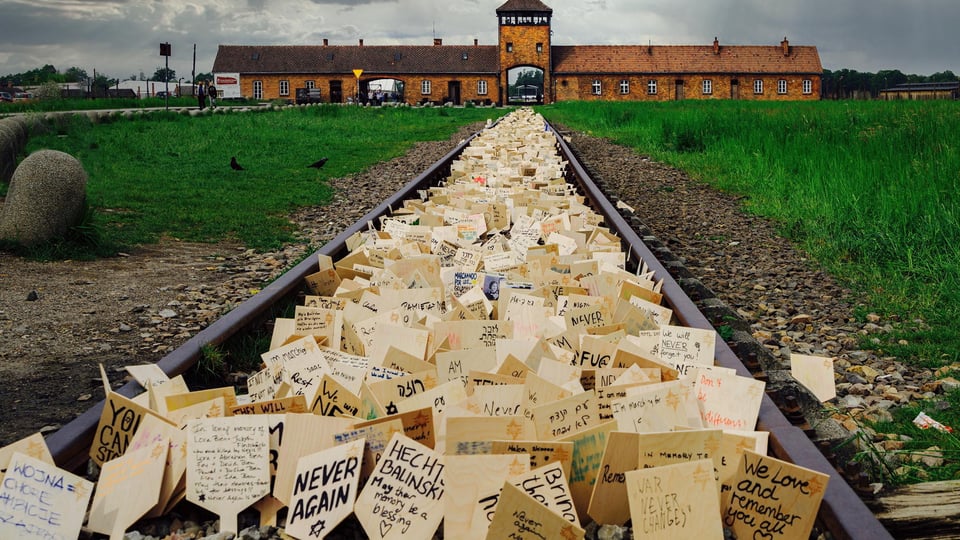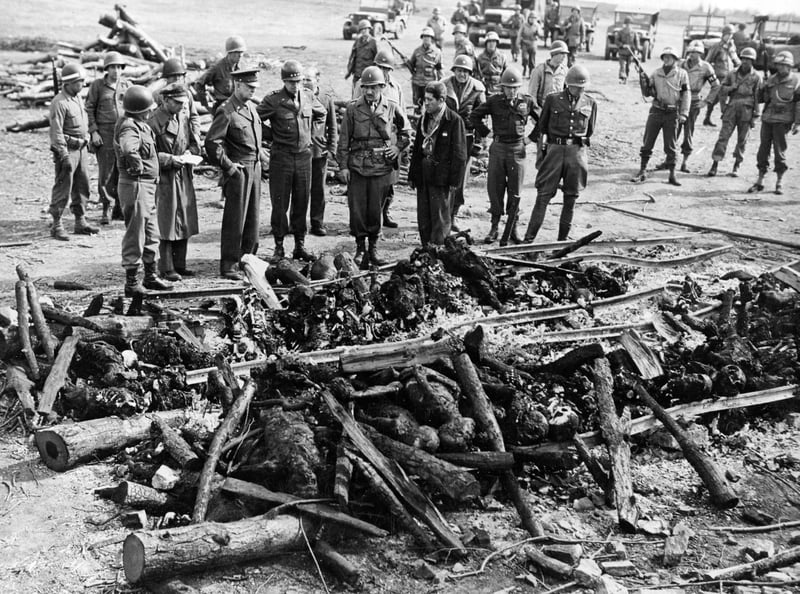75 Years After Auschwitz: Will It Ever Happen Again?

On Jan. 23, leaders from around the globe gathered in Jerusalem to commemorate the 75th anniversary of the liberation of the Auschwitz death camp—and the Holocaust. Six million European Jews were killed in the Holocaust.
During World War II, the Germans devised efficient ways to kill people considered “undesirables” by the Nazi party. What began as systematic killing of the mentally disabled soon expanded to the elimination of races deemed “undesirable” (with the Jews being the primary group targeted), as well as homosexuals, prisoners of war and those that opposed the regime. Hitler’s ultimate plan was what he termed the “Final Solution”—the extermination of all Jews from Europe.
The Nazis found that shooting civilians at short range was too traumatizing and caused too much psychological strain on soldiers. So they turned to principles of industrial efficiency used in German factories and applied them to the mass extermination of human beings.
Female slave laborers at Auschwitz, c. May 1944 (Yad Vashem/Wikimedia Commons).
As the trains arrived, 70 to 90 percent of the prisoners were sent for “delousing” (a euphemism for the gas chambers).
In 4½ years, Nazi Germany systematically murdered at least 1.1 million people at Auschwitz, of which 90 percent were Jewish. By the end of the war, an estimated 6 million Jews had been killed, which amounted to about two-thirds of the Jewish population in Europe before the war.
In a speech 50 years later, death camp survivor and writer Elie Wiesel said, “After Auschwitz, the human condition is not the same, nothing will be the same.”
Has the human race learned from those dark days? What causes human beings to commit such unimaginable acts on their fellow man?
Ironically, amid the backdrop of world leaders commemorating Auschwitz’s liberation, anti-Semitism is on the rise. The events of World War II have become a divisive political issue in certain parts of the world.
In New York City, anti-Semitic attacks increased 21 percent in 2019. New York City, once a haven of safety for the Jewish community, is now a place where members of the Jewish community say they feel increasingly frightened and unsafe.
To learn more about this problem, read our articles “Anti-Semitism” and “Never Again.”
The politicization of memory
In our politically divisive times, world leaders are reframing the events of World War II and not facing the reality of what really happened. Take, for instance, the following narratives:
- Poland has passed a law forbidding use of the phrase “Polish death camp” to describe Auschwitz in Poland. Though it’s true that it was a German-run camp located in Poland, the Polish government is attempting to enforce a historical narrative that denies Poland was complicit in any way. As originally passed in February 2018, Poland’s memory law made it punishable by up to three years in prison to claim Poland had any part in the Holocaust. (It was later softened to make it a civil offense that could result in a fine.) Israeli Prime Minister Benjamin Netanyahu responded by saying, “One cannot change history and the Holocaust cannot be denied.” The spat between Israel and Poland deepened after Poland refused to attend this year’s Holocaust memorial in Israel.
- Russia has begun rewriting its history by reemphasizing the narrative of the Soviet Union liberating Europe from Nazism in 1945. The narrative omits that during the early years of the war, the Soviet Union was an ally of Germany, supplying it with the strategic materials that enabled Nazi Germany to invade Poland and build the death camp infrastructure. The Soviet Union also occupied eastern Poland as part of the German-Soviet Nonaggression Pact. After the war, the Soviet troops were more occupiers than liberators.
- The “Alternative for Germany” (AFD) party has risen from an obscure far-right party to the second most popular political party in Germany. Its leader has called the Nazi era a “speck of bird poop” and blasted the Holocaust memorial in Berlin as a “monument of shame” that prevents Germans from recognizing their glorious national achievements.
- The Middle East is filled with narratives of the Holocaust that either downplay its scale or deny it ever happened. Some even blame the Jews themselves for the Holocaust. The aim of these Holocaust deniers is to delegitimize the reason many Jews came to Palestine to establish their homeland.
Furthermore, a recent survey found that two-thirds of American millennials couldn’t correctly identify Auschwitz as a concentration camp, and 22 percent claim never to have heard of the Holocaust.
These statistics should cause great concern. If we don’t learn the lessons of history, we risk repeating them. It is important that the history of the Holocaust be taught to future generations to help them see what mankind is capable of—and why hatred should never be allowed to rise to that level.
Sadly, the Bible reveals that a more terrifying time awaits us in the future.
“Never again”
Gen. Dwight D. Eisenhower and other officials inspect a cremation pyre after the liberation of the Ohrdruf concentration camp in Germany on April 12, 1945 (U.S. Holocaust Memorial Museum/Wikimedia Commons). 
He foresaw that some would attempt to deny the historicity of the Holocaust—which is now happening in our time.
At this year’s Holocaust anniversary, U.S. Vice President Mike Pence reminded the audience of their “solemn obligation” to remember and “to say with one voice: Never again.”
Sadly, our world has already failed to learn the lessons of Auschwitz. Since 1945, mankind has continued to commit ghastly atrocities and genocides:
- China (1958-1962): The founder of the People’s Republic of China, Mao Zedong, killed as many as 45 million people through starvation or violence in his “Great Leap Forward.”
- Bangladesh (1971): The Bangladesh Liberation War resulted in the deaths of around 1.5 million people when Bangladesh (formerly East Pakistan) fought for its independence from West Pakistan.
- Cambodia (1975-1979): Pol Pot’s brutal Khmer Rouge killed between 1.7 million and 2.2 million Cambodians through starvation and execution.
- Bosnia (1992-1995): Over 200,000 Muslim civilians were killed in an attempt by the Serbs to ethnically cleanse the land of Muslims.
- Rwanda (1994): The Hutu Power government went on a 100-day killing rampage of Tutsis, killing over 800,000 people.
- Darfur, Sudan (2004): Arab militias loyal to the Sudan government began killing 100,000 to 400,000 non-Arabs in Western Sudan. It became known as the first genocide of the 21st century.
Sadly, even greater genocides are yet in our future and will affect the Jewish people again. Psalm 83 speaks of nations forming an alliance to destroy the physical nation of Israel (Psalm 83:2-8). The prophet Zechariah tells us that the nations will gather around Jerusalem and take “half of the city” captive (Zechariah 14:2).
The book of Revelation speaks of a red horse, ridden by one of the four horsemen of the Apocalypse, who has a “great sword” to “take peace from the earth” (Revelation 6:4). The end-time wars will include a 200-million-man army that will kill a third of all mankind (Revelation 9:16, 18).
Jesus Christ said that this future time will be worse than any previous time in human history (Matthew 24:21). That means that this future time will be even worse than the historical genocides described above. All of the above examples occurred in specific geographical areas, but this future time of war, violence and suffering will encompass the entire earth.
Yet the words “Never again” are still relevant.
People can live by the motto “Never again” by committing their lives to God and His way of life—which is a way of peace and love toward others, even our perceived enemies (Matthew 5:44).
Ultimately, “Never again” will be fulfilled when Jesus Christ returns to rule this earth, establish His Kingdom and to begin an age of peace.
May God speed that day!
Photo credit:
MWayOut/iStock via Getty Images
Date Posted: February 5, 2020



